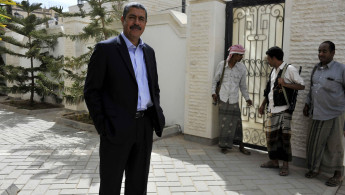Yemen: Houthis move to forestall Riyadh talks
Bahah said the militant Shia Zaydi group - better known as the Houthis - had granted him the freedom to travel inside and outside of Yemen.
The timing cannot be separated from the stalling of talks led by UN Special Adviser to Yemen Jamal Benomar as Gulf countries prepare - at the request of President Abd Rabbo Mansur Hadi - to hold talks in Riyadh, far from Houthi control.
Bahah released
Bahah posted on his Facebook page on Monday that he intended to leave Yemen temporarily and that he was allowed to move freely. Bahah also confirmed his government had resigned for good, and would not return.
| Bahah said his release was "An honest goodwill gesture from the spirit of responsibility." |
A source close to the negotiations told al-Araby al-Jadeed that Bahah would not return to his role as prime minister, and that his had been a condition set by the Houthis for his release.
This means he will not join forces with Hadi, who escaped house arrest, renounced his resignation and has since attempted to get rid of the Houthis.
Bahah said his release was "an honest goodwill gesture in the spirit of responsibility, to which everyone is adhering so as to make a positive push towards the political process currently being overseen by the UN".
Bahah's release came a day after Benomar demanded it.
Riyadh talks
Observers think Benomar made the request for Bahah's release to win political favour after he came under increased criticism. Recent developments in the country have also indicated discord between Gulf states and Benomar, who so far has not taken a formal stance on talks between Yemeni parties in Riyadh.
A Yemeni political source told al-Araby al-Jadeed that Benomar, who returned to Sanaa on Friday after visiting Riyadh and Doha, is now supervising the negotiations between political parties in the capital and has ignored Hadi, who welcomed moving the talks to Riyadh under the watch of the Gulf Cooperation Council (GCC).
GCC Secretary-General Abd al-Latif al-Zayani has said the Riyadh talks differed from the UN-sponsored dialogue in Sanaa. Saudi-allied media have also been noted for their criticism of Benomar, with many saying his role was legitimising the "Houthi coup".
Benomar announced after Hadi left for Aden he had entrusted him with setting the place for talks in a city other than Sanaa, which he thought was no longer safe.
Hadi later sent an official message to Saudi Arabia, which was published by the Royal Court, requesting the GCC oversee the Riyadh talks so as to "maintain Yemen's security and stability, uphold legitimacy and reject the coup against it, not cooperate with the so-called constitutional declaration [in which the Houthis announced they had taken over] and reject its legitimacy, return weapons and military equipment to the state and return the state's authority to all Yemeni territory".
Leaks that emerged from the UN Security Council last week suggested Gulf states have submitted though Jordan a draft statement to the Council, which welcomed Hadi's calls to move the dialogue to Riyadh.
Some permanent members of council, however, reportedly insisted Benomar had the right to set the location of the talks.
But the Houthi chief insists taht talks be held in the Yemeni capital, which remains under Houthi control:
"The motives of these [Gulf] countries to move the talks outside the country are unclear, and this bolsters [the possibilities] of completing the talks in Sanaa."
Some Yemeni political analysts think moving the talks to Riyadh would mean the Yemeni issue would be transferred from Benomar - who has been overseeing the political agreements and negotiations since the beginning of the transitional phase - to Riyadh. Whether or not he attends the scheduled talks, his influence will likely be diminished alongside the influence of Gulf countries.
The Houthis and the Saudis
| The pro-Saudi media launched a campaign criticizing Benomar, saying he was legitimizing the “Houthi coup”. |
The Houthis also revealed in their recent statement that indirect communications with Saudi Arabia "had taken place during the last two days, in which the will to restore relations between the two countries was confirmed, on the basis of mutual respect and non-interference in internal affairs and the exchange of mutual benefits."
This is a step back from the escalation noted in the past few weeks, which reached the point of the Houthis conducting armed training exercises in areas bordering Saudi Arabia and the announcement that several economic deals had been signed with Iran.
There are competing interpretations of the remarks made by the Houthis' leader on communications with Saudi Arabia, especially after the deals with Riyadh's regional rival Iran - which will give Yemen oil for a year, set up an electricity power plant and develop the strategic Hudaydah port on the Red Sea.
Many believe the Houthis' communications with Riyadh are an attempt to ease fears towards the deals struck between the Houthis and Tehran.
This is an edited translation from our Arabic edition.



